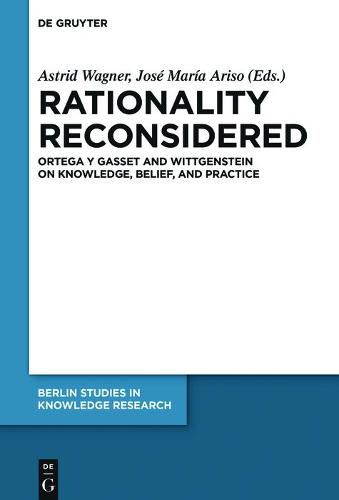Readings Newsletter
Become a Readings Member to make your shopping experience even easier.
Sign in or sign up for free!
You’re not far away from qualifying for FREE standard shipping within Australia
You’ve qualified for FREE standard shipping within Australia
The cart is loading…






This volume treats the topic of rationality developing a perspective that integrates elements of philosophy of language, phenomenology, pragmatism, and philosophy of life.
The two reference authors, Wittgenstein and Ortega, are contemporaries but come from different philosophical traditions. Wittgenstein’s early work was influenced by logical positivism. Later he developed an influential approach to philosophy of language. Ortega was influenced by Neo-Kantianism, perspectivism, life philosophy, and phenomenology. On this basis, he developed an independent approach that has become known as ratiovitalism.
Astonishing affinities between their respective reflections on rationality motivated the experiment of bringing the different approaches into a synergetic relation. Both investigate the structures and limits of rationality, emphasize the importance of basic beliefs, and criticize the restriction of rationality concepts to the intellectual sphere.
The contributions of the volume focus on: dynamics of belief and knowledge, implicit and explicit knowledge, the concept of vital reason , the role of world-pictures and forms of life, questions regarding certainty, ignorance, doubt, and madness, as well as matters of pluralism and relativism.
$9.00 standard shipping within Australia
FREE standard shipping within Australia for orders over $100.00
Express & International shipping calculated at checkout
This volume treats the topic of rationality developing a perspective that integrates elements of philosophy of language, phenomenology, pragmatism, and philosophy of life.
The two reference authors, Wittgenstein and Ortega, are contemporaries but come from different philosophical traditions. Wittgenstein’s early work was influenced by logical positivism. Later he developed an influential approach to philosophy of language. Ortega was influenced by Neo-Kantianism, perspectivism, life philosophy, and phenomenology. On this basis, he developed an independent approach that has become known as ratiovitalism.
Astonishing affinities between their respective reflections on rationality motivated the experiment of bringing the different approaches into a synergetic relation. Both investigate the structures and limits of rationality, emphasize the importance of basic beliefs, and criticize the restriction of rationality concepts to the intellectual sphere.
The contributions of the volume focus on: dynamics of belief and knowledge, implicit and explicit knowledge, the concept of vital reason , the role of world-pictures and forms of life, questions regarding certainty, ignorance, doubt, and madness, as well as matters of pluralism and relativism.